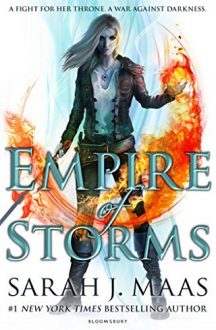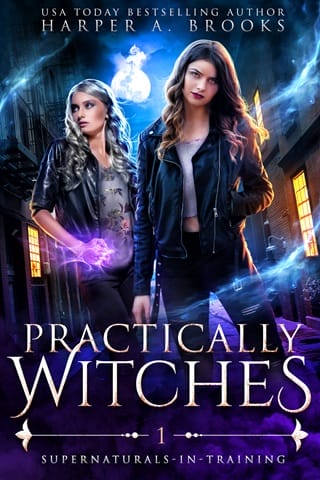Chapter 51
51
Eyllwe’s coast was burning.
For three days, they sailed past village after village. Some still burning, some only cinders. And at each of them, Aelin and Rowan had labored to put out those flames.
Rowan, in his hawk form, could fly in, but … It killed her. Absolutely killed her that they could not afford to halt long enough to go to shore. So she did it from the ship, burrowing deep into her power, stretching it as far as it could go across sea and sky and sand, to wink out those fires one by one.
By the end of the third day, she was flagging, so thirsty that no amount of water was able to slake it, her lips chapped and peeling.
Rowan had gone to shore three times now to ask who had done it.
Each time the answer was the same: darkness had swept over them in the night, the kind that blotted out the stars, and then the villages were burning beneath flaming arrows not spotted until they had found their targets.
But where that darkness, where Erawan’s forces were … there was no sign of them.
No sign of Maeve, either.
Rowan and Lysandra had flown high and wide, searching for either force, but … nothing.
Ghosts, some villagers were now claiming, had attacked them. The ghosts of their unburied dead, raging home from distant lands.
Until they started whispering another rumor.
That Aelin Galathynius herself was burning Eyllwe, village by village. For vengeance that they had not aided her kingdom ten years ago.
No matter that she was putting out the flames. They did not believe Rowan when he tried to explain who soothed their fires from aboard the distant ship.
He told her not to listen, not to let it sink in. So she tried.
And it had been during one of those times that Rowan had run his thumb over the scar on her palm, leaning to kiss her neck. He’d breathed her in, and she knew he detected an answer to the question that had caused him to flee that morning on the ship. No, she was not carrying his child.
They had only discussed the matter once—last week. When she’d crawled off him, panting and coated in sweat, and he’d asked if she was taking a tonic. She merely told him no.
He’d gone still.
And then she had explained that if she’d inherited so much of Mab’s Fae blood, she might very well have inherited the Fae’s struggle to conceive. And even if the timing was horrible … if this was to be the one shot she had of providing Terrasen a bloodline, a future … she would not waste it. His green eyes turned distant, but he’d nodded, kissing her shoulder. And that had been that.
She hadn’t mustered the nerve to ask if he wanted to sire her children. If he wanted to have children, given what had happened to Lyria.
And during that brief moment before he’d flown back to shore to put out more flames, she hadn’t possessed the nerve to explain why she’d hurled her guts up that morning, either.
The past three days had been a blur. From the moment Fenrys had uttered those words, Nameless is my price, everything had been a blur of smoke and flame and waves and sun.
But as the sun set on the third day, Aelin again shoved those thoughts away as the escort ship began signaling ahead, the crew frantically working to drop anchor.
Sweat beaded on her brow, her tongue parchment-dry. But she forgot her thirst, her exhaustion, as she beheld what Rolfe’s men had spied moments ago.
A flat, waterlogged land under a cloudy sky spread inland as far as the eye could see. Moldy green and bone-white grasses crusted the bumps and hollows, little islands of life among the mirror-smooth gray water between them. And among them all, jutting up from brackish water and humped land like the limbs of an ill-buried corpse … ruins. Great, crumbling ruins, a once-lovely city drowned on the plain.
The Stone Marshes.
Manon let the humans and Fae meet with the captains of the other two ships.
She heard the news soon enough: what they sought lay about a day and a half inland. Precisely where, they didn’t know—or how long it’d take to find its exact location. Until they returned, the ships would remain anchored here.
And Manon, it seemed, would join them on their trip inland. As if the queen suspected that if she were left behind, their little fleet would not be intact when they returned.
Clever woman.
But that was the other problem. The one facing Manon right now, already looking anxious and put-out.
Abraxos’s tail lashed a bit, the iron spikes scraping and scratching the pristine ship deck. As if he’d heard the queen’s order a minute ago: the wyvern has to go.
On the flat, open expanse of the marshes, he’d be too noticeable.
Manon placed a hand on his scarred snout, meeting those depthless black eyes. “You need to lie low somewhere.”
A warm, sorrowful huff into her palm.
“Don’t whine about it,” Manon said, even as something twisted and roiled in her belly. “Stay out of sight, keep alert, and come back in four days’ time.” She allowed herself to lean forward, resting her brow against his snout. His growl rumbled her bones. “We’ve been a pair, you and I. A few days is nothing, my friend.”
He nudged her head with his own.
Manon swallowed hard. “You saved my life. Many times. I never thanked you for it.”
Abraxos let out another low whine.
“You and me,” she promised him. “From now until the Darkness claims us.”
She made herself pull away. Made herself stroke his snout just once more. Then backed a step. Then another. “Go.”
He didn’t move. She bared her iron teeth. “Go.”
Abraxos gave her a look full of reproach, but his body tensed, wings lifting.
And Manon decided she had never hated anyone more than she hated the Queen of Terrasen and her friends. For making him leave. For causing this parting, when so many dangers had not been able to cleave them.
But Abraxos was airborne, the sails groaning in the wind of his wings, and Manon watched until he was a speck on the horizon, until the longboats were being readied to bring them to the high grasses and stagnant gray water of the marshes beyond.
The queen and her court readied, donning weapons like some people adorned themselves with jewelry, moving about in question and answer to one another. So similar, to her Thirteen—similar enough that she had to turn away, ducking into the shadows of the foremast and schooling her breathing into an even rhythm.
Her hands trembled. Asterin was not dead. The Thirteen were not dead.
She’d kept the thoughts about it at bay. But now, with that flower-smelling wyvern vanishing over the horizon …
The last piece of the Wing Leader had vanished with him.
A muggy wind tugged her inland—toward those marshes. Dragging her red cape with it.
Manon ran a finger down the crimson cloak she’d made herself wear this morning.
Rhiannon.
She’d never heard a whisper that the Crochan royal bloodline had walked off that final killing field five centuries ago. She wondered if any of the Crochans beyond her half sister knew the child of Lothian Blackbeak and a Crochan Prince had survived.
Manon unfastened the brooch clasping the cloak at her shoulders. She weighed the thick bolt of red fabric in her hands.
A few easy swipes of her nails had her clutching a long, thin strip of the cloak. A few more motions had her tying it around the end of her braid, the red stark against the moon white of her hair.
Manon stepped out of the shadows behind the foremast and peered over the edge of the ship.
No one commented when she dumped her half sister’s cloak into the sea.
The wind carried it a few feet over the waves before it fluttered like a dying leaf to land atop the swells. A pool of blood—that’s how it looked from the distance as the tide carried it out, out, out into the ocean.
She found the King of Adarlan and Queen of Terrasen waiting at the railing of the main deck, their companions climbing into the awaiting longboat bobbing on the waves.
She met eyes of sapphire, then those of turquoise and gold.
She knew they’d seen it. Perhaps not understood what the cloak had meant, but … understood the gesture for what it was.
Manon flicked her iron teeth and nails back into their slits as she approached them.
Aelin Galathynius said quietly, “You never stop seeing their faces.”
It was only when they were rowing for the shore, spindrift soaking them, that Manon realized the queen hadn’t meant the Thirteen. And Manon wondered if Aelin, too, had watched that cloak floating out to sea and thought it looked like spilled blood.
 Fullepub
Fullepub 



